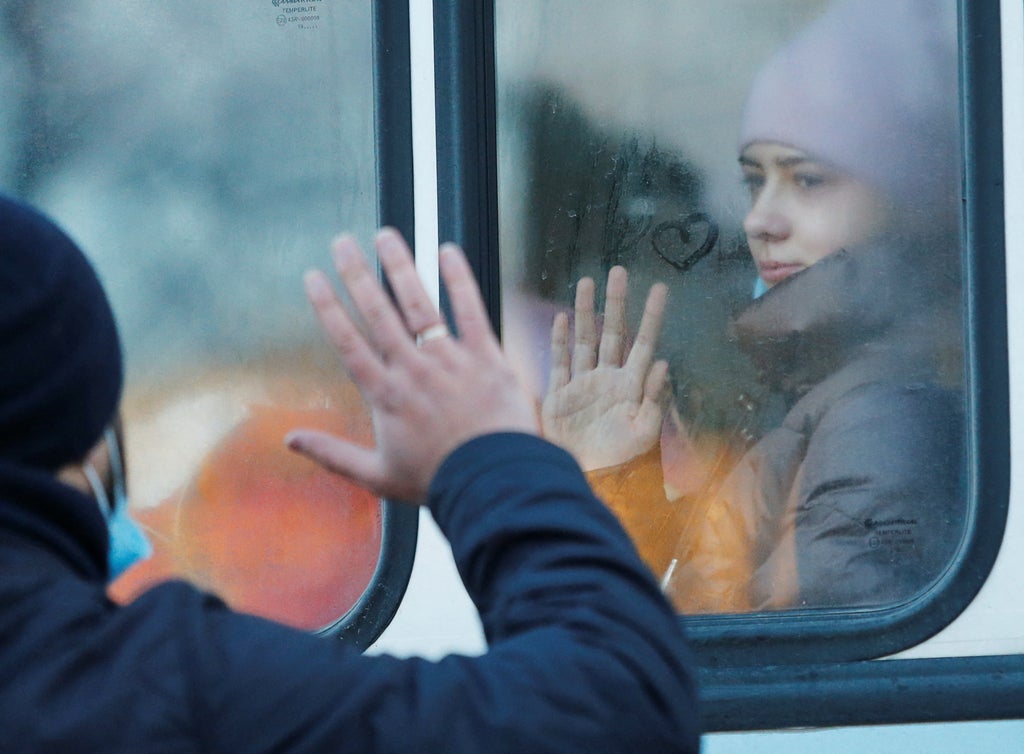
After weeks of rising tensions between Russia and Ukraine over Moscow’s build-up of military forces along its western border with its neighbour, matters appear to be coming to a head.
Shelling has intensified in recent days in eastern Ukraine along a long-simmering frontline between Russian backed separatists and Ukrainian forces, while western leaders and officials have issued repeated warnings that an invasion is likely to happen in a matter of days.
The UK has seen intelligence that suggests Vladimir Putin’s plan to invade Ukraine is already under way, Downing Street said on Monday, echoing a similar warning by US vice president Kamala Harris on Saturday.
On Monday, Mr Putin said he was considering requests to formally recognise two eastern Ukrainian regions held by pro-Russian separatist groups as independent states.
Denis Pushilin and Leonid Pasechnik, leaders of the self-proclaimed Donetsk People’s Republic (DPR) and Luhansk People’s Republic (LPR) respectively, made the requests to the Kremlin and asked for military and financial aid as the situation in those regions became increasingly critical.
The Russian leader duly informed his security council that it was necessary that their appeals be considered seriously.
Mr Putin was told by his predecessor, Dmitry Medvedev, now deputy chairman of the council, that he believes a majority of Russians would support the two regions’ independence claims, adding that around 800,000 Russian citizens live in the DPR and LPR.
Granting independence would give Mr Putin a pretext to send troops across the border while arguing that he was doing so to protect the breakaway states as fellow allies against Ukraine.
Both the DPR and LPR declared their independence on 12 May 2014 after Mr Putin annexed the Crimean Peninsula in response to his preferred pro-Moscow presidential candidate, Viktor Yanukovych, having been driven from power by mass protests.
An estimated 14,000 people have been killed in the ongoing conflict in the region over the last eight years, with Nato and Ukraine accusing Russia of arming the separatist rebels, a charge the Kremlin denies.
The DPR and LPR are officially considered terrorist organisations by Kiev, although that is not a designation agreed upon by the US, EU or other international bodies.
Their previous leaders, Alexander Zakharchenko and Igor Plotnitsky, were signatories to the Minsk agreements of 2014 and 2015, which were forged in the hope of ending the violence but which were never enacted because of differing interpretations of the accords.
Russia insisted that it was not a party to the conflict and that the agreement therefore did not apply to it, arguing that it could not remove armed forces and military hardware from Donetsk and Luhansk because the combatants were part of a separatist insurgency and not its own.
Both sides continued to disagree, with Ukraine viewing the Minsk accords as a means by which it could re-establish control over its border while Russia saw them as a chance to grant autonomy to the rebel territories, effectively giving it a voice in Ukrainian foreign policy by proxy.
The prospect of elections in the Donbas industrial heartland that houses the DPR and LPR were also controversial given that they raised the possibility of former separatist warlords sitting in parliament or winning high office within the police, an outcome regarded as intolerable by many Ukrainians.







